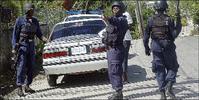
St James police personnel conduct a spot check along Sun Valley Road in Montego Bay on January 18, 2007, following the imposition of a curfew on Norwood the previous night. Government is seeking to enact legislation to extend the powers of the police to impose curfews. - File photo
The following is an analysis of one of six bills, designed to tackle the problem of crime and violence, now being debated by a joint select committee of Parliament.
ONE OF THE six crime bills being considered by a joint select committee of Parliament is entitled: An Act To Make Interim Provision Extending The Powers Of Arrest And Detention Under Sections 50B and 50F of the Constabulary Force Act.
It proposes to extend the special powers of arrest which exist, under the Constabulary Force Act, when a curfew or cordon is established in a particular locality.
The commissioner of police, under the law at present, has certain powers to establish a curfew in a particular locality, with the written approval of the minister of national security. The police commissioner also has power to establish a cordon around any particular locality in Jamaica.
Such a curfew may be imposed between such hours as are specified by the minister, requiring persons within that locality to remain within their premises during those hours. The persons within that locality may, however, be authorised in writing by the officer in charge of the curfew to venture outside of their premises.
crime detection and prevention
These powers are given to the commissioner for the specific purpose of crime detection and prevention. So that, under the Constabulary Force Act, where the commissioner, having regard to the nature or extent of criminal activity in any particular locality, has reasonable grounds to believe that the interest of public safety or public order requires it, or for the purpose of preventing or detecting crime, he may move to establish a cordon or impose a curfew.
When the commissioner takes action in this regard, the members of the security forces are not at large in the enforcement of such actions as may be necessary. They may exercise such powers as are vested in a constable while carrying out his functions as a constable, with one exception.
That exception is that, they may enter and search a dwelling house without a warrant for the purpose of apprehending any individual, if they have reasonable suspicion that such an individual is in the course of committing or has committed or is about to commit, an offence.
reasonable grounds for the arrest
Again, during such operations, the security forces may not arrest or detain any individual unless the officer in charge of the operations is satisfied that there are reasonable grounds for the arrest or detention of such individual.
There are further strictures imposed on the security forces in these types of operations; they are not at large. If an individual is arrested or detained, he must, there and then, be informed as to why he is being arrested or detained.
The reasonable grounds for his arrest or detention do not rest with the security forces alone; he must forthwith be taken before a justice of the peace who must then determine whether there are reasonable grounds for his arrest or detention.
Where the justice of the peace is so satisfied, further investigations may be necessary. In such circumstances, the justice of the peace may order that the individual be kept in custody for a period not exceeding twenty-four hours, after which he must be brought before a resident magistrate for any further action that is to be taken.
There is one exception to the rule that he must be brought before the magistrate, that is, if it is intended that an identification parade is to be held.
immediate release
Of course, where the justice of the peace is not satisfied that the detention or arrest of an individual is reasonably required in the interest of justice, he shall order the immediate release of the individual.
The Government now proposes, by this bill, to introduce more stringent conditions and to widen the scope with respect to the arrest and detention of individuals under these special powers.
First, it is recalled that the powers of arrest of members of the security forces, in these special circumstances, relate specifically to individuals who are within the locality of the cordon or the curfew.
It is said, however, that there are several individuals who pursue their criminal activity within a certain locality, but reside outside of that locality. It is also said that often, Twenty-four hours is too short a period for persons arrested or detained in these circumstances to be properly processed and for in-depth investigations to be carried out.
The bill, therefore, proposes that:
Because of the current level of crime, a decision has been taken to temporarily extend (for a period of one year) the provisions of ... the Constabulary Force Act so as to:
a) Provide for the arrest and detention of a person outside the locality in which the special cordon and curfew powers are being exercised, if a divisional commander or a member of the force not below the rank of assistant commissioner is satisfied that there is reasonable ground for suspecting that the person is, or has been, or is about to be, involved in the commission of a criminal offence in the locality.
b) Increase, from twenty-four to seventy-two hours, the period for which a justice of the peace may ... order (a) person ... to be remanded in custody before being released or taken before a resident magistrate.
If the bill is passed by Parliament, the act is to remain in force for a period of one year from the date of its commencement and shall then expire.

